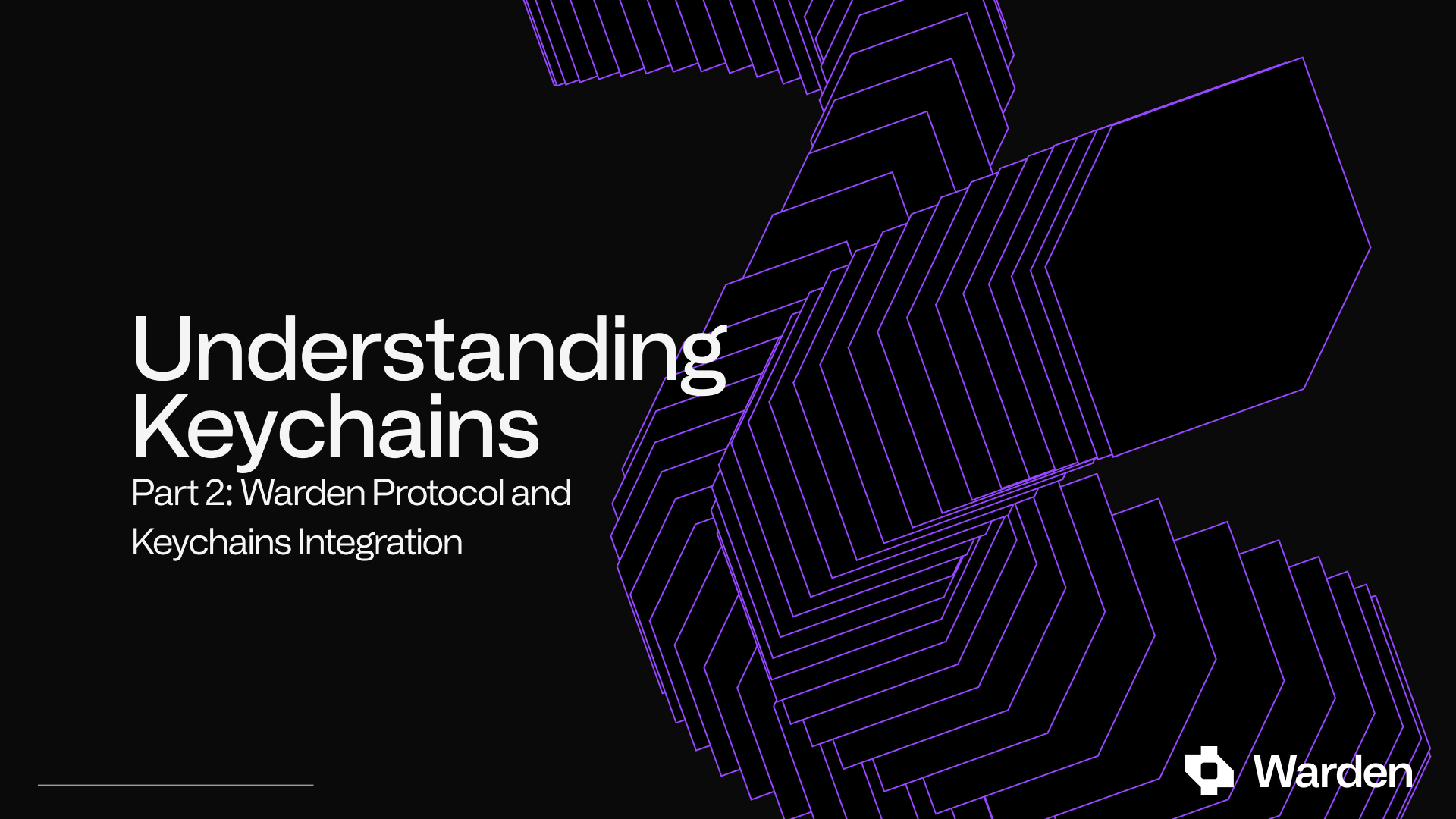
Warden Protocol and Keychain Integration
What are Keychains?
A Keychain is any type of key management solution for private keys. Keychains not only generate and store your private keys, but also sign transactions. They play a vital role in enhancing security and flexibility within the Warden Protocol. Within Warden Protocol, Keychains are modular components that allow users to generate and manage cryptographic keys securely. These keys include public keys (wallet addresses) and private keys (used to sign transactions), which are fundamental to blockchain operations, ensuring the integrity and confidentiality of transactions. Keychains provide users with the flexibility to select key management solutions tailored to their specific needs and preferences.
Read our documentation about Keychains
Users can choose from a variety of Keychain options, each offering unique features and capabilities. For example, some Keychains may leverage Hardware Security Modules (HSM) for tamper-resistant key storage, while others may utilize Multi-Party Computation (MPC) for distributed key generation and signing. In Warden’s Intent Configurator, users can configure their own application security settings. This feature puts users in control of defining their own spectrum of custody, which includes the following:
Holding user-owned keys
Sharding keys and splitting them between users and enterprises
Delegating custody to an ISO-compliant, SOC-audited digital asset custodian
Leveraging the latest in distributed key-management protocols
Warden is also exploring a new variant of multisig, composed of different Keychains & custodial models collaborating via user-driven intents.
As a user, you might not want to rely solely on a single Keychain. Instead, you might opt for a dmultisig (decentralized multisignature) setup across different Keychains; so even if one goes out of business, you can still access your funds. A good example is FTX, which controlled users' keys, and users depended on the exchange to access their holdings. Users were unable to withdraw their own assets once FTX began experiencing liquidity issues. Had users employed a dmultisig across different Keychains, they could have retrieved their funds without issues.
In essence, Keychains in Warden Protocol empower users with enhanced control over their cryptographic keys, facilitating secure and flexible key management solutions. Whether for retail investors seeking individualized security measures or institutional investors requiring robust custodial solutions, Keychains play a pivotal role in safeguarding digital assets within the blockchain ecosystem. With features like BYOK (Bring Your Own Key), Keychain integration, and minimized custodial risks, Warden Protocol sets the standard for secure and flexible key management. The icing on the cake is SpaceWard: the user-friendly UI for composing and managing accounts.
The Ways Warden Protocol Helps Keychain Operators
By leveraging a range of innovative solutions, Warden Protocol empowers users with enhanced security, flexibility, and control over their cryptographic keys, setting a new standard for secure and resilient key management in the decentralized landscape:
1. Multi-Party Computation (MPC) Solutions
Warden Protocol supports a framework where MPC providers can participate. This allows multiple parties to collaboratively compute cryptographic operations without exposing individual inputs, thereby enhancing the resilience of key management processes.
2. Custodians and Keychain Monetization
As an open protocol, Warden Protocol enables custodians to integrate with its ecosystem, rather than integrating custodians itself. While this openness broadens participation, it does not automatically guarantee that all custodians are 'trusted'. Furthermore, Warden Protocol introduces Keychain monetization features, allowing Keychain operators to generate revenue through fees in the native token. This incentivizes Keychain operators, including HSM providers and MPC providers, to uphold the highest standards of security and service quality, thereby enhancing the overall security and resilience of the Warden Protocol ecosystem.
3. Integration of Hardware Security Modules (HSMs)
Warden Protocol could include in the future Hardware Security Modules (HSMs) like Ledger and Trezor in its Keychain ecosystem, utilizing their well-established tamper-resistant features to enhance cryptographic key security. HSM operators provide dedicated hardware devices equipped with advanced security mechanisms, ensuring the confidentiality and integrity of key operations.
Summary
In this second part of our exploration into Keychains within Warden Protocol, we've discussed their role as crucial components for managing cryptographic keys in blockchain operations. Keychains offer secure key generation and management solutions tailored to user preferences, enhancing both security and flexibility.
Definition and Function: Keychains are key management solutions that securely generate, store, and manage cryptographic keys, crucial for blockchain integrity and transactions.
Customization and Control: Users can configure security settings and define their own custody spectrum via Warden’s Intent Configurator, covering everything from key ownership to leveraging advanced distributed protocols.
Resilience Against Failures: The article underscores the benefits of using decentralized multisignature setups